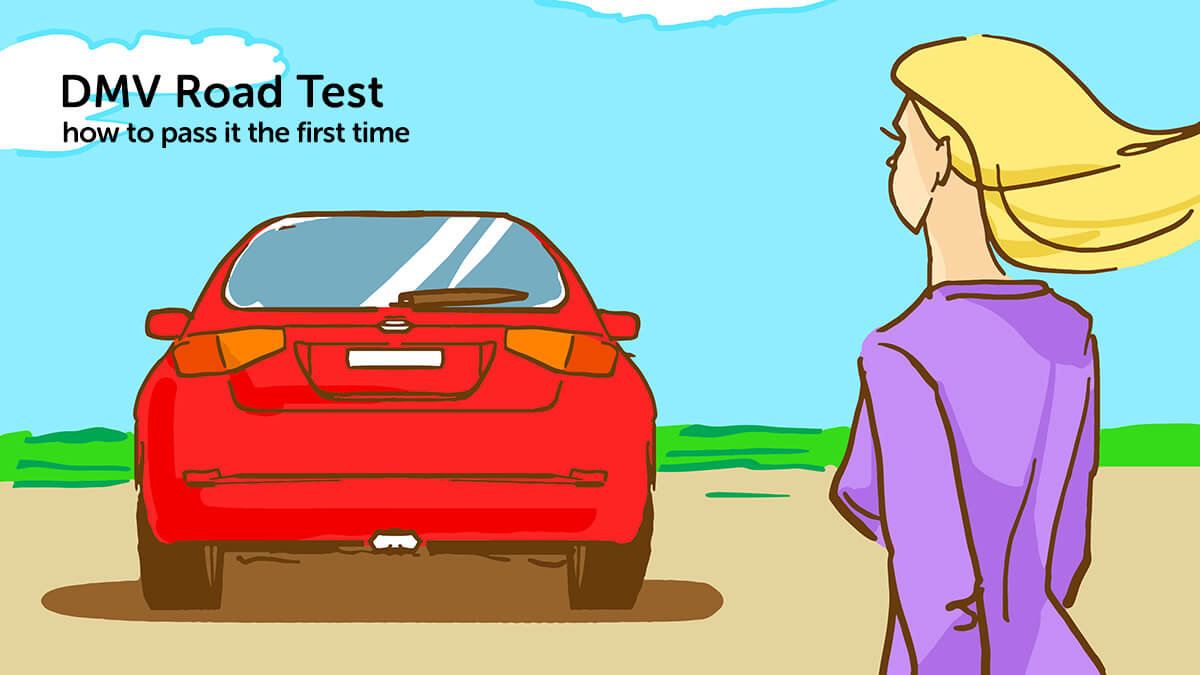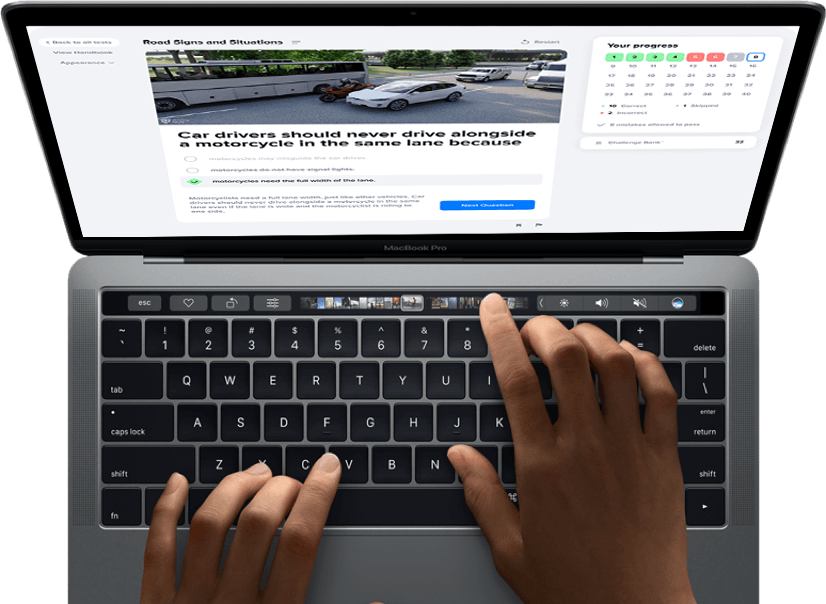The DMV driving test, also called a road test, driver's test, road exam, driver's license test and behind-the-wheel test, assesses your ability to safely and confidently operate a vehicle according to your state’s driving laws. During the test, you will drive a vehicle while a DMV test examiner evaluates your ability to control it in a variety of realistic driving situations.
- What is a road test?
- When can I take it?
- What will I be tested on?
- Do I need an appointment?
- Where will I be asked to drive?
- Who will be the examiner?
- What about the passing score?
- Can I retake it?
- How do I make sure I pass?
- How about the instruction permit and road test?
- What do I need to bring?
- What is the cost?
- What about driving privileges?
What do I need to know?
All US states and Washington, DC, require an applicant to pass a road test before being issued a driver’s license. Note that in most states, you can obtain a driver’s license without taking a road test if you already hold a valid driver’s license issued by another state (because this implies that you passed the driving test in that state). Some states also let you waive the DMV road test if you already hold a valid driver’s license issued by certain foreign countries. Use our DMV Assistant to find out the exact DMV requirements for your situation. While driving tests generally consists of theoretical questions you need to answer correctly, there are certain nuances that differ across the various states that you need to know of.
At what age will I be eligible?
The minimum age at which you may take a road test varies from state to state. Depending on the state, you may be eligible to take the road test if at least one of the following applies to you:
- You’re at least 16 years of age.
- You’ve passed certain stages of the state’s graduated driver’s license (GDL) program for young drivers.
- You’ve met your state’s requirements for new drivers.
- You’ve met your state’s requirements for drivers who have moved into your state from elsewhere.
What skills will I be evaluated on?
You should prepare to be tested on a wide variety of driving skills: driving through an intersection; backing up, perhaps around a corner; three-point turns; left- and right-hand turns; and changing lanes. Some states may also test your ability to drive on a freeway. If so, be prepared to safely enter a highway, pass other vehicles and exit the highway. Many states also require you to demonstrate competency at parallel parking. Check your state’s manual to see if this will be included in your road test.
As you perform these skills, the test examiner will observe if you’re handling your vehicle lawfully and safely.
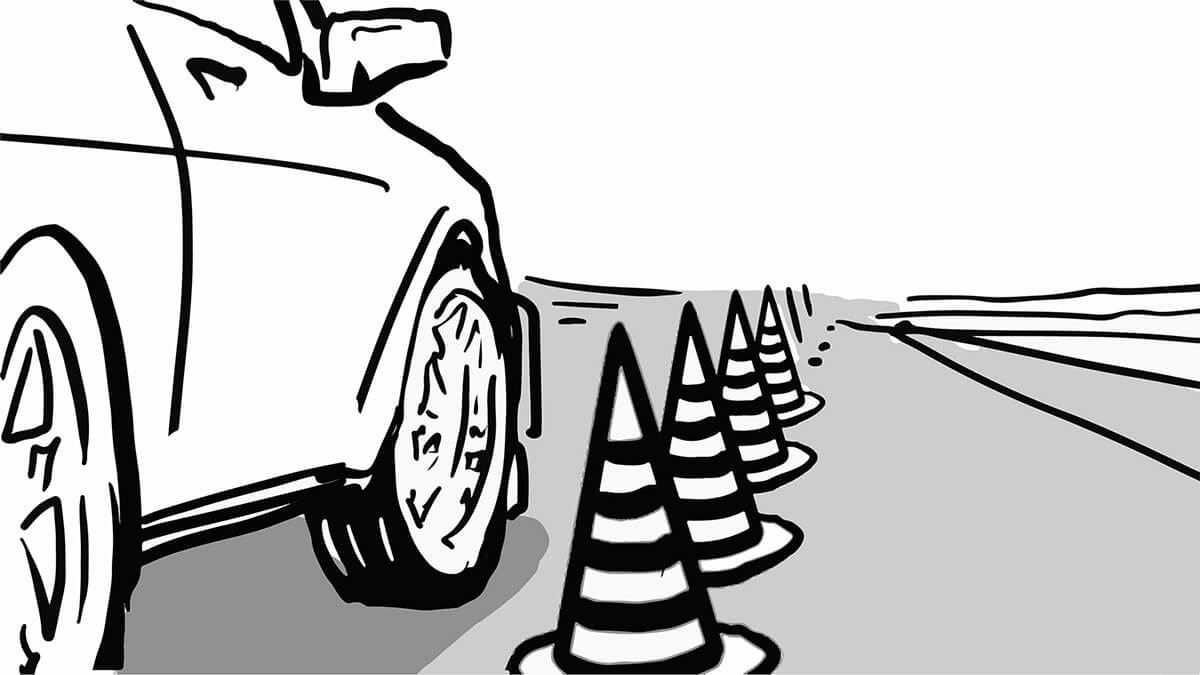
Demonstrate your driving skills to the examiner without critical errors, and you should be good
The examiner will also rate you on using your turn signals, leaving the appropriate amount of space between your car and other vehicles, accelerating and braking smoothly, checking your mirrors and blind spots, and obeying all speed limits, traffic signs and signals, and pavement markings. You’ll most likely be tested on driving through a residential or business area, so make sure you know the default speed limits for those areas; they’re not always posted. Before the road test, you should get familiar with driving around the DMV location where you plan to take your test. Familiarize yourself with the various traffic signs and signals and the general layout of the area.
What else will they test me on?
Before you begin the DMV road test, the examiner will check your vehicle to ensure it’s safe to drive. He or she will check whether the lights and signals are working, the windshield is free of cracks and provides an adequate field of vision, and the tires are in good condition. The examiner will cancel the rest of the test if he or she deems the vehicle unfit to drive safely.
Once you’re in the driver’s seat, the examiner may ask you to identify and demonstrate the various controls of the vehicle. He or she may ask you to turn on the windshield wipers, activate the turn signals, turn on the emergency flashers, check your rear-view and side mirrors, and set the parking brake. Here are the most common controls the examiners across the country want you to demonstrate:
You don’t have to be the owner of the vehicle as long as you are thoroughly familiar with its controls. However, to ensure your success on the driving test, it’s a good idea to use the same vehicle in which you have practiced driving.
Do I need to make an appointment? If so, how?
In most states, road tests are administered only by appointment. Some states let you schedule your driving test online; others require you to contact the DMV to schedule the test. Check your state’s DMV website to find out what you’ll need to do.
The road test typically takes about 20 to 30 minutes. Even after you pass the test, there may be an additional wait time at the DMV to process your paperwork, take your picture, and issue a license once you pass. Make sure to plan your day accordingly.
You should arrive at least 15 minutes early on test day. Allow some extra time in case you need to fill out any forms and to make sure you feel calm and unhurried before you start your test.
Where will I be asked to drive?
Driving test locations vary by state, but most states’ driving tests include a variety of driving locations. You may be required to demonstrate some skills while still in the parking lot. Then your test examiner will instruct you to drive to another location, such as a residential street, main road, or highway to evaluate some of your other driving skills.
The examiner will observe and grade your actions, so stay calm and follow his or her instructions. If you’re not sure of what the examiner is asking you, you can ask him or her for clarification.
What should I expect from the examiner?
Your test examiner does not want you to fail. He or she will not try to trick you or ask you to do anything dangerous or illegal. The examiner is only there to evaluate your driving and ensure that you are a safe driver. He or she will have a clipboard or something like it with a list of skills that you must demonstrate satisfactorily. Do not pay attention to what the examiner writes; it could be either good or bad. Just consider him or her a passenger as you focus on your driving.
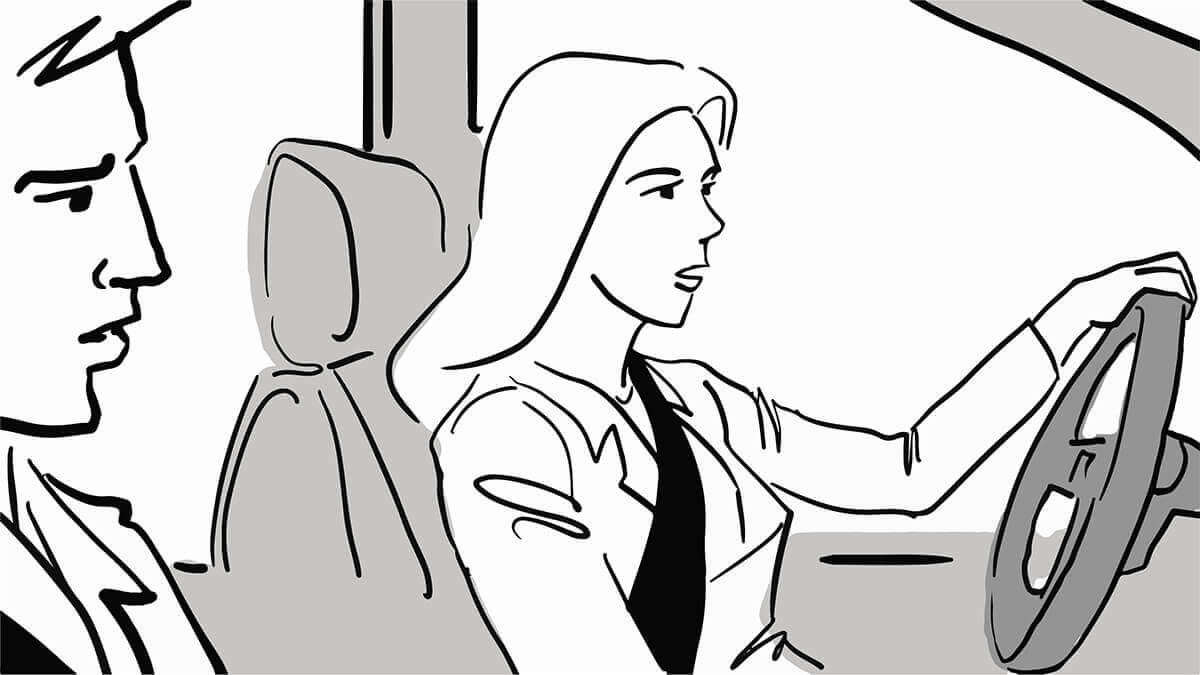
You are not expected to have a chat with your examiner; concentrate on the road instead
How many things can I get wrong and still pass?
Each state has its scoring system. However, no state requires you to achieve a perfect score. You can make some minor mistakes during the pre-drive portion of the test and again during the drive without necessarily failing the test. However, dangerous or illegal actions such as speeding, failing to stop at a red light or stop sign, failing to yield to pedestrians, or causing a traffic accident will constitute an automatic failure of the road test. Also, if the DMV examiner needs to intervene in any way such as grabbing the steering wheel to avoid a collision, it will count heavily against you.
Can I retake it if I fail?
Yes! You can retake the road test if you fail on your first try. Most states require you to wait a certain number of days or weeks before you may retest, though you may want to wait even longer while you practice your driving skills to ensure you can pass this time. Your test examiner will be able to let you know how long you’ll need to wait.
What can I do to make sure I pass?
Practice! The more time you drive supervised in various driving situations, the more comfortable you’ll be on your test day. Feel free to ask your driving supervisor many questions, and have him work with you to perfect your driving skills. Make sure you’ve read your state’s driver’s manual thoroughly so that you’re familiar with all speed limits and safe driving practices. Some state manuals list the specific criteria on which you’ll be evaluated during the driving test. Emphasize those particular skills during your supervised driving practice.
Do I have to get an instruction permit first?
Virtually all states require aspiring drivers under 18 years of age to obtain an instruction permit (also known as a learner’s permit) before taking a driving test. Many states also require older aspiring drivers to get an instruction permit; the other states require older aspiring drivers to pass a written or computerized knowledge test first. (Those drivers may even be able to pass the knowledge test and driving test on the same day.)
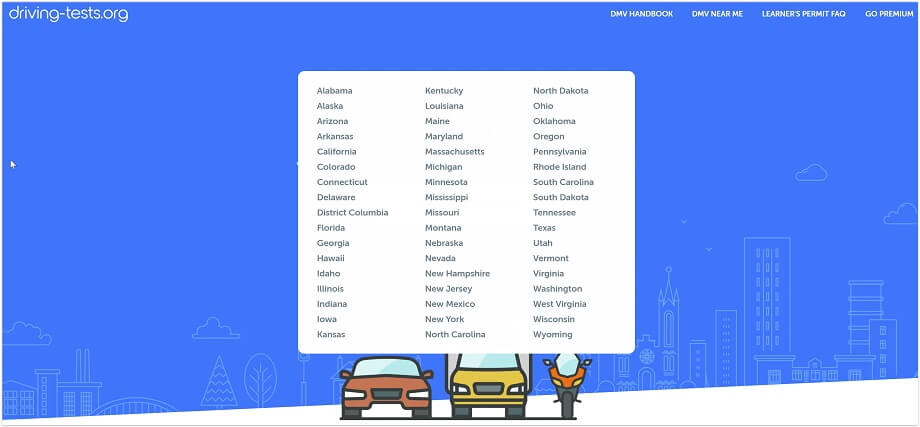
The easiest way to prepare for the knowledge test is to take our free practice tests. Just choose your state (Free practice tests)
Even if your state does not legally require you to obtain an instruction permit at your age, you must still get one to be allowed to practice driving under appropriate supervision.
If you’re under 18 years of age (21 in some states), you’ll likely be required to participate in your state’s Graduated Driver’s License (GDL) program. Many state GDL programs require you to pass a written or computerized knowledge test, obtain an instruction permit, and hold the permit for a specified minimum period before you may take a driving test. Most GDL programs also require you to certify that you’ve practiced driving for a certain minimum number of hours before you may take the driving test.
Will I ever have to retake the road test once I pass it?
In certain circumstances, you may be required to retake your driving exam even if you have already passed it. If your driver’s license expired long ago or was suspended or revoked, you may need to retake both the knowledge and driving tests. In some states, once you reach a certain senior age, you’ll be required to retake the knowledge test or driving test. Your state may also require you to retake the driving test if they have concerns about your ability to drive safely for medical reasons.
What do I need to bring with me on the day?
Bring your instruction permit, vehicle registration, and proof of insurance on test day. If you’re participating in the Graduated Driver’s License (GDL) program for your state, you may also need to bring certification that you passed a driver’s education course or fulfilled a certain minimum number of hours of supervised driving. If you need to wear glasses or contacts while you drive, make sure you’re wearing those on test day. Check with your local DMV if they require any other paperwork.
Some modern vehicles have automated aids to assist in driving, such as self-parking and adaptive cruise control. Many drivers have also equipped their cars with interior cameras. Most states prohibit the use of such technologies during driving test. If your vehicle is equipped with such features, check with your DMV about whether you’ll have to disable them before the start of your driving test.
Because you still won’t be legally able to drive unsupervised, a responsible adult such as your parent, guardian, or driving instructor must accompany you to your driving exam. This person must be able to drive your vehicle away after your test if you still won’t have a driver’s license.
During the driving test, the only people allowed in the car will be you and your test examiner. Family members and pets must wait at the testing center during your driving test.
What is the cost?
Driving test fees and license fees vary from state to state. Check your DMV’s website or ask your local DMV branch.
Once I’ve passed, what happens?
Congratulations!
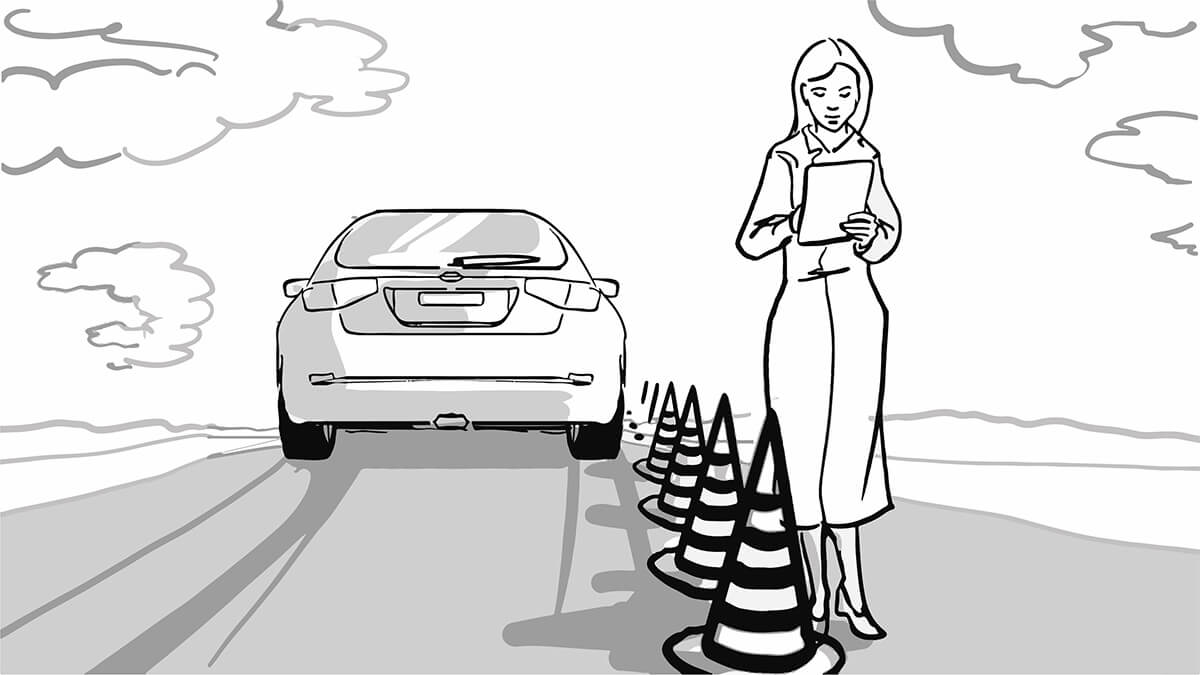
Enjoy this moment as it's the beginning of a new exciting chapter of your life!
Your driving test examiner will give you a form stating that you passed your driving test. Take it to your local DMV office along with any other paperwork they require. At the DMV, you’ll fill out a driver’s license application, submit all that paperwork, pay the appropriate fees, and have your picture taken. Because of new security requirements, you may be issued a temporary license valid for a month or two. Your permanent license will be mailed to you before your temporary license expires.
Now that I have my driver’s license, do I have unlimited driving privileges?
Not necessarily. If you’re under 18 (21 in some states) and you’re participating in your state’s Graduated Driver’s License (GDL) program, you may be issued a so-called graduated driver’s license (also known as an intermediate or provisional driver’s license) for underage drivers. With such a license, your driving will still be restricted. Depending on the state, you may be prohibited from driving late at night or carrying passengers who are unrelated to you.
If you’re at least 18 (21 in some states), you’ll obtain a full driver’s license or trade your graduated license for a full one. With a full license, your driving won’t be restricted.
However, regardless of your age, you must always drive safely and obey all traffic laws. Any driver who violates traffic laws can have his or her driver’s license suspended or revoked. In some states, you can even lose your driving privileges for some offenses unrelated to driving, such as failing to pay child support.
